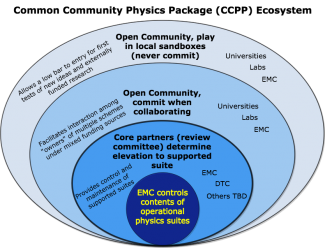As the Common Community Physics Package (CCPP) heads toward operational status within NOAA’s numerical weather prediction (NWP) advancement efforts, the community that helped make it a reality will gather virtually alongside the “CCPP-curious” for the CCPP Visioning Workshop on August 15-17 to discuss plans for its continued improvement over the next 5-10 years. A strong emphasis for the workshop will be placed on accommodating the software coupling needs of the next generation of physics parameterizations. A second emphasis will be placed on discussing the need for additional features to improve ease of development within the framework, the capability to take advantage of fine-grain parallelism within large portions of physics suites, and any changes the current implementation requires to be able to support the needs of the atmospheric composition and chemistry communities, among other advancing ideas. These topics are expected to comprise the majority of the agenda for the latter two days of the workshop, while the first day of the workshop will focus on conveying the current status and capabilities, code management practices, and known issues of the software package. It is hoped that the first part of the workshop can teach the fundamentals to those who are unaware of how the system works and the development process therein, while the final two days will serve as a platform for physics developers, model developers interested in physics-dynamics coupling, code managers and computational scientists to plan the more advanced, future-looking topics.
Just like the CCPP software, the workshop is intended to be “model-agnostic” and participants working with models such as the Unified Forecast System (UFS), the CCPP Single Column Model (SCM), the Navy Environmental Prediction sysTem Utilizing the NUMA corE (NEPTUNE), the Community Earth System Model (CESM) Community Atmosphere Model-System for Integrated Modeling of the Atmosphere (CAM-SIMA), the Weather Research and Forecasting (WRF) model, the Model for Prediction Across Scales (MPAS) and others are highly encouraged to participate. Also, if there is enough interest in a particular model’s CCPP implementation (ascertained via a pre-workshop survey), breakout groups for model-specific discussions will be considered. A broad range of modeling expertise will help to foster a more productive discussion of best practices for interoperability and collaborative development for model physics, a key tenet of the CCPP. The modeling diversity is reflected by the workshop organizing committee, whose members represent the DTC, NOAA GSL, NOAA EMC, NCAR CGD, NCAR MMM, and academia.
The goals of the CCPP Visioning Workshop are at least two-fold. First, participants should come away with a common understanding of the current state of the CCPP, how to engage in the development process, and how to find help via documentation or direct questions to CCPP-aligned staff. The second goal is to create a prioritized list of advancements to the CCPP software framework required to keep pace with advancing scientific and technological frontiers over the next 5-10 years. Such a list, together with the continued hard work from DTC staff, community scientists and engineers, and broad organizational support to address its items, should go a long way toward delivering on the original promise of the CCPP – better scientific exchange and understanding within the atmospheric physics community, and the opportunity for the community to more effectively cooperate toward the goal of improving weather forecasts.
To learn more about the workshop and registration process, visit the CCPP Visioning Workshop website.
For more news related to CCPP, see the Lead Story article: CCPP Goes Operational.

